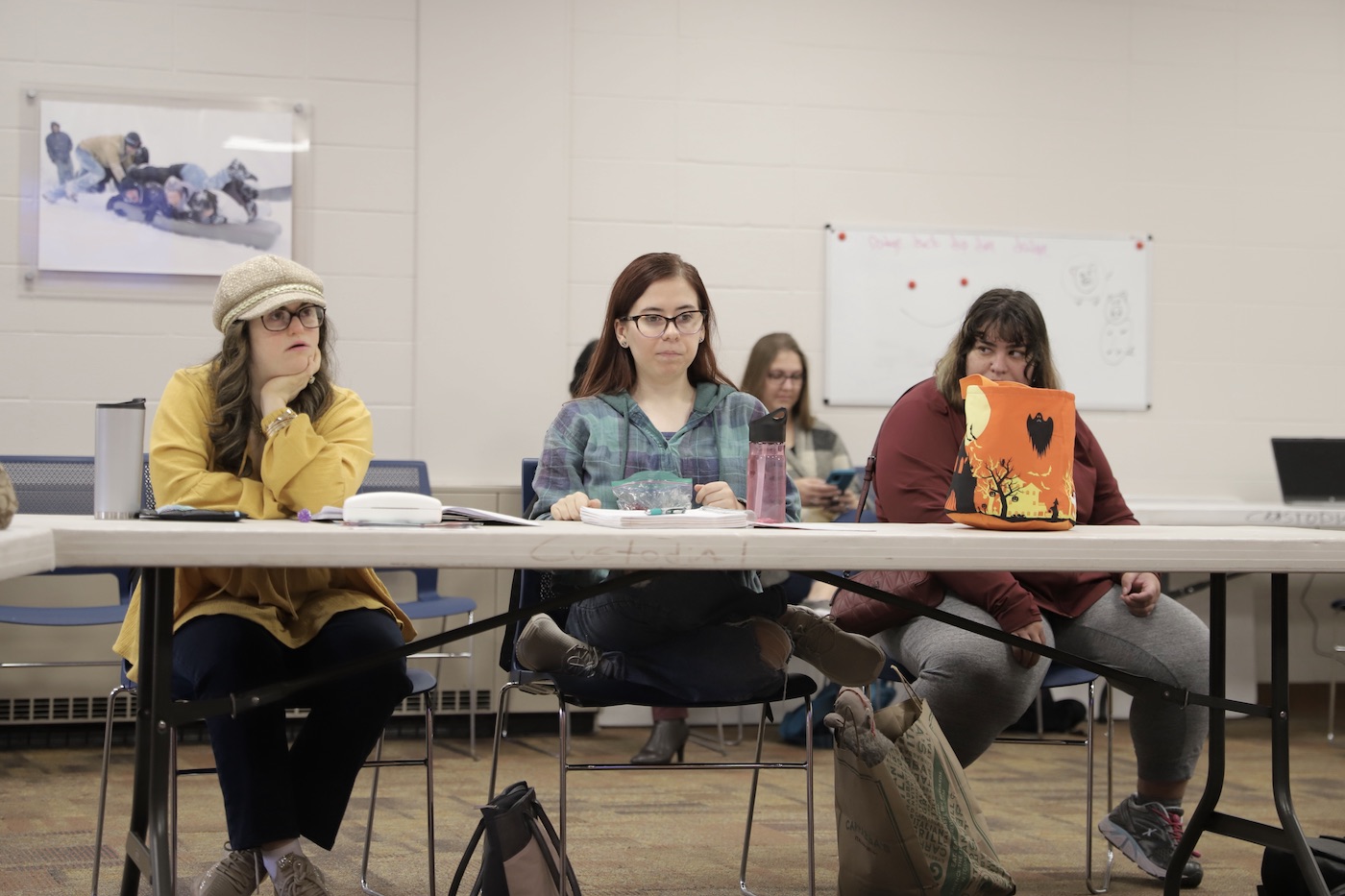No Longer Left Behind: The PLACE Program is Breaking Down Barriers for Students with Special Needs
Alyse Calandro smiles as she walks into class sporting her latest college swag—a Frankie the Bulldog keychain attached to her new DeSales University branded backpack.
She sits down next to her classmates before asking, “Professor Felten, what country are we learning about today?”
“You’ll have to wait and see,” says Elisabeth Felten, assistant professor in the division of business, with a smile. Felten has been teaching for nearly three decades. But this class, she says, feels like winning the Super Bowl on Christmas morning.
Felten singlehandedly created and launched the Post-Secondary Lifelong Adapted Continuing Education Program, or PLACE Program—a unique offering designed for adult learners who are denied a traditional college education due to their disabilities.
What started as a pilot program in the fall of 2022 is currently in its second semester in the Dorothy Day Student Union. Though the program is not sponsored by DeSales, Felten reserves space to hold classes on Tuesdays from 10:00 a.m. to 3:30 p.m.
“I don’t think anybody really understands how much this program means to us,” says Terilyn Calandro, Alyse’s mother. “It really does mean everything. I’ve given my daughter, with Libby’s help and DeSales’ help, a college experience.”
Alyse was born with Down syndrome and Hirschsprung’s disease, an intestinal disorder. She loves to learn, especially when it comes to dance, music, and art. But students with special needs age out of the school system at 21. After that, there is typically nowhere for them to go.
“You think when your kid is born with a disability that those are the hardest times. And it is hard. But after your kid graduates high school, the world drops off. And if they don’t continue learning after high school, everything they learned is gone. I don’t mean it gets less; it is gone.” -Terilyn Calandro, Alyse’s mother

For the past eight years, Alyse (pictured above, left) has been practicing reading, writing, and math at home each day, aside from weekends and holidays. Calandro says they never stopped because they never gave up hope that one day, they would find a program that catered to Alyse’s needs.
That’s why she’s willing to drive nearly three hours roundtrip from their home in Yardley, Bucks County, to DeSales’ campus, so that Alyse can attend Felten’s class each week.
“There are other universities and other classes that say they’re friendly to the disabled,” Calandro says. “They are friendly to the handicapped as far as wheelchair accessibility. But that’s not what we are talking about. There is a range with disabilities that goes from one to a million, and in the middle are all these students.”
The PLACE Program isn’t just a professional undertaking for Felten; it’s also extremely personal. Her daughter, Isabella, is one of the students. When Isabella graduated from high school in June of 2022, Felten, like many parents of special needs children, knew there was nothing else out there for her daughter once she received her high school diploma. It was after she ran into one of her daughter’s friends that Felten knew she needed to act.
“He said, ‘I play Fortnite eight hours a day.’ That was the motivator for me to say, ‘Okay, I hear you, Lord.’”
Felten talked to more and more parents and realized just how great the need really is in the Lehigh Valley and beyond. She began her research and modeled the PLACE Program after a similar concept in Staten Island, New York.
“It’s unlikely these students will go onto college, they may not be a candidate for gainful employment, and they may not qualify for government assistance,” she says. “They want that education, but they essentially fall through the cracks.”
The PLACE Program is a non-degree program, but Felten still wanted it to have the look and feel of a real college experience. She adapted the curriculum—which includes science, math, literature and creative writing, and world cultures—to the students’ needs. She even sent each applicant, including her daughter, an acceptance letter in the mail.
Felten bills the program as a place for those who don’t fit anywhere else. It’s lifelong and all students are welcome, as long as they’re 18 or older. She says the students in her class are engaged and eager to participate each week. She’s received positive feedback from both students and their parents. And, the gains she’s already seeing, including an increase in independence among students, proves that the program is working.
“I’m speechless and tearing up most of my day,” Felten says. “It just fills my soul.”
If Calandro had her way, she would clone Felten and the PLACE Program and put them in every college campus across the country. For now, she’s just happy that her daughter finally has a safe, caring, and inclusive environment to thrive in again and a teacher who goes above and beyond each week to ensure that students with special needs are no longer left behind.
“I’m wrapping my arms around Libby because I think she has created a program that will stand the test of time with disabilities,” Calandro says. “The students feel invested in the University as well, they feel like part of the campus. And that is such a huge thing for my daughter to feel because I can’t help her feel those things, I can’t make her feel those things, I can’t do anything but put her in a situation where hopefully it’ll come. And it finally did.”



